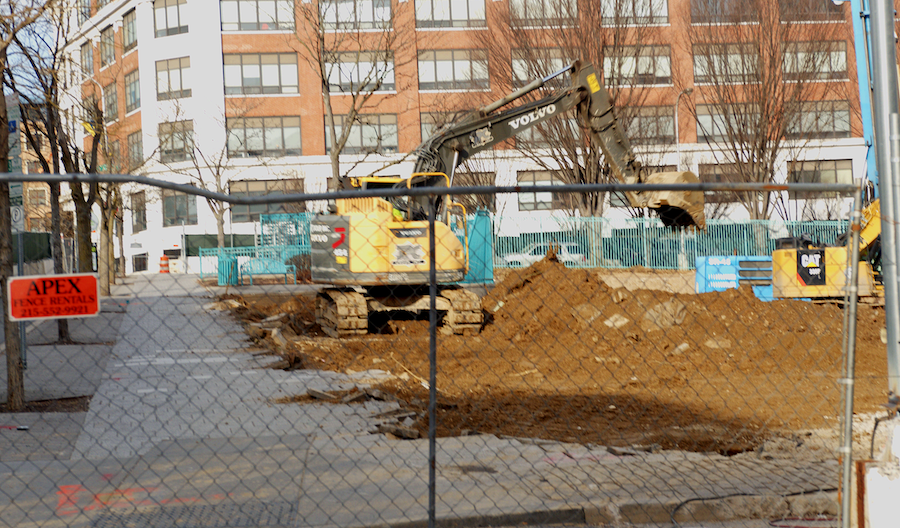
Since Drexel University announced Buckley Field’s imminent closure last March, it was only a matter of time before construction began and the once vibrant campus green space underwent a complete transformation.
On Thursday Jan. 19, the Drexel community received an email signaling the start of Buckley’s demolition by the Philadelphia-based development firm Gattuso Development Partners. Though this project is heralded by university representatives as a transformative move furthering Drexel’s academic mission, there are several instant effects on the Drexel campus community that some find less than stellar.
Tim Kreutzfeldt, head coach of Drexel’s Ultimate Frisbee team Spitfire, and one of his players, sophomore graphic design major Evan Whittaker, have seen first-hand the effects that Buckley’s closure has had on club sports. While they do not presume to speak to the experience of all student organizations that once used Buckley, Spitfire notes that it has been put in a precarious position with the field’s closure.
Despite being a Drexel employee, Kreutzfeld learned of Buckley’s imminent closure at the same time as the rest of the campus. Since the announcement, significant operational changes have worsened the experience for Spitfire’s players and management.
“It’s not that [Spitfire’s practice time] was cut substantially, it was cut entirely,” recounted Kreutzfeldt. “We were told our practices would begin in late February…I don’t know if that means they’re gonna have the Bubble up and ready by then or if they’re gonna open their outdoor field space back up to us for practices, but as far as I know, the ultimate team and every other outdoor/indoor club sport has not had any practice times or locations thus far this quarter.”
The “Bubble” Kreutzfeld refers to is the aptly named Buckley Bubble, a 30,000 square foot inflatable dome first utilized by Drexel Athletics in the winter of 2019 into 2020. The Bubble has traditionally allowed Drexel students use of outdoor recreation space as temperatures plummeted, but with the closure of Buckley, its iconic shape has since disappeared from campus, and with it, the option for outdoor practices.
“Last year, we would practice in Buckley for, say, 90 minutes twice a week…Spring is our competitive season, so we kind of rely on January and February in order to get in as much practice time as we can to prepare for our playoffs,” explained Kreutzfeldt.
Spitfire has since had to explore alternatives to traditional practices, and in an effort to prepare for their upcoming season, Kreutzfeldt has signed the team up for nearly double the amount of tournaments they would attend in a typical year. But this solution still has limitations, a fact acknowledged by both Kreutzfeldt and his players.
“[Tournaments are] a bigger commitment because you have to travel and there’s costs, hotel costs and stuff like that, that aren’t associated with just practice…It’s a big commitment for weekends when I have homework,” elaborated Whittaker.
But a heavier financial burden is not the only factor in consideration.
“It’s the only real practice we’re getting…especially with new players, they don’t get as much playing time…because of the lack of practice, there’s no way to get better at frisbee,” Whittaker said. “We, as a frisbee team, are falling behind because we are already given significantly less field time than other schools who have more field time or field space in general. And we see it in our team performance as well as in our camaraderie. We don’t have as much time as a team together, which sucks, because of Buckley being closed.”
Though Kreutzfeld and Whittaker recognize the necessity of new developments on Drexel’s campus and their difficult position as a club team that doesn’t bring any revenue to Drexel, they both admit they will miss Buckley and the opportunities it afforded to Spitfire.
To the Drexel administration, the benefits of this new project vastly outweigh any short term disruptions caused by the construction.
Vice President of Real Estate and Facilities Alan Greenberger is incredibly optimistic about the opportunities the new life sciences building will bring to Drexel. Greenberger views the building as an essential long-term investment in the well-being of Drexel, saying it will provide unparalleled access to co-op opportunities, career networking, and collaborative research.
“As a university that is probably one of the oldest in the nation committed to experiential learning, these are very powerful, mission-based reasons why we’re doing what we’re doing. That’s the investment being made.”


